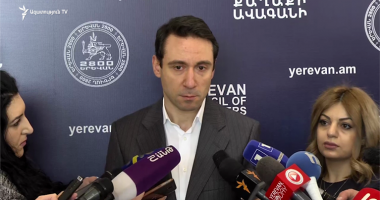BY NORA VOSBIGIAN (London)
The recent English translation of Missak Khralian’s memoir, Palahovid; An Ancestral Memoir, makes for shocking reading. Originally published in 1938 by Masis Press in Sofia, Bulgaria, this is the memoir of a child survivor of the Armenian Genocide.
Missak Khralian was a 14 year-old boy in the village of Til, near the town of Palou in upper Diyarbekir province, when the Ottoman Turks embarked on the genocide of Armenians in 1915. Khralian was young enough to avoid summary execution alongside the Armenian men of the village, and old enough to survive, escape, and bear witness to what happened.
Starting with the execution of the men, followed by the general deportation of remaining Armenians, Khralian was among twenty or so Armenian women and children who were kept in Til to be assimilated into Muslim households. These captive Armenians had to renounce their identities and become Muslims. The women were expected to be taken by local Muslim men, or face new deportations, and death.
As Khralian recounts, the whole process of murder and assimilation was supervised by Ottoman state officials and carried out by local Turks and Kurds.
Khralian was much abused and exploited as a captive but, unlike the young women, he was able to move about, looking after his Kurdish master’s animals. He was thus able to make invaluable observations and establish contacts with other victims. His memoir-testimony is thus informed and cuts across many aspects of the Armenian Genocide. He presents us with a detailed account of what he witnessed, including the fate of several young Armenian girls who were killed under terrible circumstances. Khralian’s work makes for excruciating reading.
According to Khralian, 70% of the 160 Armenians in Til were killed within a month of persecutions, i.e. the outright killing of all adult men and the deportation and disappearance of mostly women (but also some children.) Of the women who were kept behind, 30% were taken by Muslim men and survived, and 70% were either killed by their captors or forced into new deportations in August 1915. The Armenian children who were separated were placed in Muslim families and subjected to assimilation. A small number of these children were still killed or disappeared.
At the end of WWI, many of the older children escaped to orphanages in Kharpert, including the author and a few relatives, before these orphanages were closed by the Kemalist forces. Khralian’s account suggests that the very young children and women could not escape, especially women who had borne children to their captors. According to Khralian’s account, and comparable sources, one could estimate that up to 15% of Armenians in the Palou region survived the Armenian Genocide. While a number of these survivors escaped at the end of WWI, up to 10% of the region’s original Armenian population (around 1,000 women and children) remained behind. Their descendants would number in the thousands today.
(This article-review was written following an interview with Ara Sarafian, the executive director of the Gomidas Institute).
Missak Khralian, Palahovid: An Ancestral Memoir, trans. from Armenian by Simon Beugekian; ed. with an intro. by Ara Sarafian, (London: Gomidas Institute, 2021), xx + 160 pages, map, photos, ISBN 978-1-909382-63-3, pb., US$25.00. For more information visit www.gomidas.org/books or contact [email protected]











1 comment
Turkey has continued its evil work down to the present day.